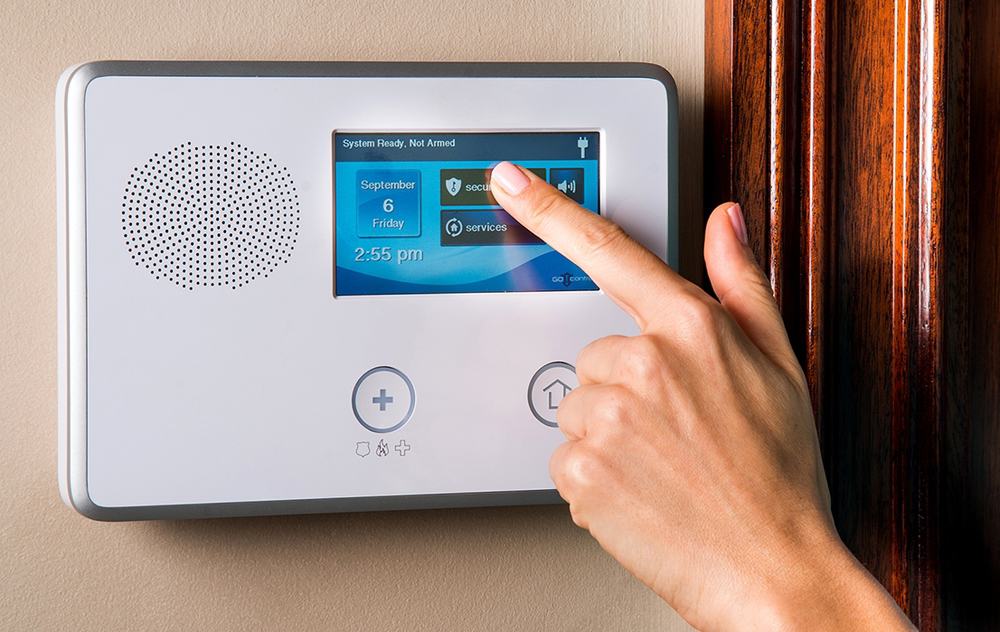Home Security Monitoring Service vs. Self-Monitoring: The Choice Requires Careful Consideration
Do-it-yourself (DIY) home security solutions are increasing in popularity as tech-savvy Millennials enter the home-buying market, while technology becomes less daunting for Baby Boomers.
That’s why two of the world’s most powerful brands have placed big bets on the trend toward self-installed security and smart-home solutions. Google used its acquisition of Nest in 2014 to create a smart-home ecosystem that includes the Nest Secure DIY solution, while Amazon purchased Ring last yearwith the same goal.
But no matter which system you choose, purchasing and installing a DIY security system is only the first part of the equation. Once your system is in place, you have to consider whether you want to monitor it yourself or choose a professional home security monitoring service.
How Does Monitoring Work?
The idea behind self-monitoring is simple: When there’s an alarm, you’ll be alerted via smartphone and can contact authorities if necessary. If you’ve got video cameras, you might even try to verify what’s going on and try to avoid a false alarm. You won’t have to rely on a home security monitoring service, and you’ll save a few bucks every month.
Having a professionally monitored home security system is also simple. You’ll still be alerted via smartphone when an alarm is triggered, and you’ll still be able to keep track of what’s going on. The major difference is that a trained professional responds to the alarm – no matter when it occurs – then determines the appropriate course of action and contacts first responders if necessary.
Cost-Savings Vs. Totally Worth It!
Sooner or later, the preference for self-monitoring is bound to come back to one theme: No monthly fees or long-term contracts. You save at least $200 to $400 a year since you’re not paying for help that you may never need. And you’re not bound to a provider that you’re not happy with.
A home security monitoring service typically costs anywhere from $20 to $40 or more per month, depending on your level of service. Some companies offer month-to-month monitoring rates, while others require an agreement of 36 months or more. But you’re paying for an incredibly important service: Fast assistance from trained monitoring professionals whenever you need it.
No doubt, it feels good to save hundreds of dollars each year. But it’s also true that during a home emergency, professional monitoring is the fastest way to get help when time is precious.
Flying Solo vs. Professional Response
The key word is “professional.” As an example, Dallas-based Brinks Home Security handles more than 2 million alarms each year. A skilled emergency dispatch operator handles thousands of alarms, but not without receiving countless hours of training, mentoring, and quality control each year. It’s their job to know the right thing to do in any given circumstance.
You’re very skilled at what you do because of training, education, and experience. But when your smartphone alerts you that someone has entered your home, it’s not a situation you prepare for. Time means everything, and there’s no script to follow. Even with intense concentration and no distractions, you have to figure out the correct measures one step at a time. That’s asking a lot.
Many homeowners gladly accept the responsibility of self-monitoring, with the understanding that they’ll have to come through quickly during a potential crisis. But there’s no substitute for experience.

911 Isn’t Always The Answer
Even children know that when there’s trouble, you dial 911 for help. But with home security, it’s not that simple, especially when you’re away from home.
Let’s say you live in Chicago, but you’re on business in Miami. You get an alarm notification and use your smartphone to verify that there’s an intruder. Naturally, you dial 911.
Here’s the problem: Dial 911 in Miami and you’re not going to get authorities who are near your home. You’ll be connected with 911 closest to your location, since your phone automatically sends its signal to the nearest cell tower. When your home in Chicago is being burglarized, 911 in Miami isn’t going to be much help.
This can even be true within a large metropolitan area, since major cities and suburbs can be far apart. If you’re too far away, you’ll get 911 for the area you’re in at the time. That’s the advantage of a monitored home burglar alarm system– especially when you’re away.
A Final Word About Smartphones
It’s easy to imagine living without a smartphone. Just tuck it away in the back of a drawer or on top of a bookcase, then go through the rest of your day. If you’re like everyone else, you’ll have it back in your hands before sundown and never let it go again.
The fact that you’re rarely apart from your smartphone is a strong plus for self-monitoring. There may be times when you’re without coverage – in an airplane, a parking garage, an important business meeting, or dozens of other instances – but today’s cellular coverage is more reliable than ever.
Any top-rated DIY home security system communicates quickly whenever there’s an alarm. As long as you’ve got coverage, you’re in touch. However, it’s worth remembering that you’ll have the same level of smartphone functionality through any quality home security system – whether you choose self-monitoring or a professional home security monitoring service.
The Case For Self Monitoring
We’ve already discussed some of the reasons for choosing self-monitoring over a monitored home security system, including saving money and avoiding long-term contracts. Other advocates cite:
- A lower risk of false alarms, since first responders will show up at your home only if you call them.
- Simplicity. If you move, just take your DIY devices with you. If you buy a completely new system, there’s no need to notify a monitoring provider.
- A level of comfort knowing that you’re in charge of your protection. No matter what happens, you’re calling the shots whenever there’s a crisis.
Be An Informed Consumer
Ultimately, choosing between self-monitoring and a professionally monitored home security system is more than about money or convenience. It’s about your lifestyle, and the level of protection that you’re comfortable with.
Self-monitoring might make sense if you’re on a fixed income, if you rarely leave home, or if you consciously practice what steps to take when there’s an alarm. A home security monitoring service is preferable if you want the peace of mind that comes from knowing that – no matter what, no matter when – your property and loved ones are protected.
You took the time to research and choose an effective do-it-yourself home security solution that’s right for you. But even if you installed it yourself, that doesn’t mean you have to monitor it yourself. Carefully consider your needs, talk with your loved ones, and choose the path that makes sense for you.


